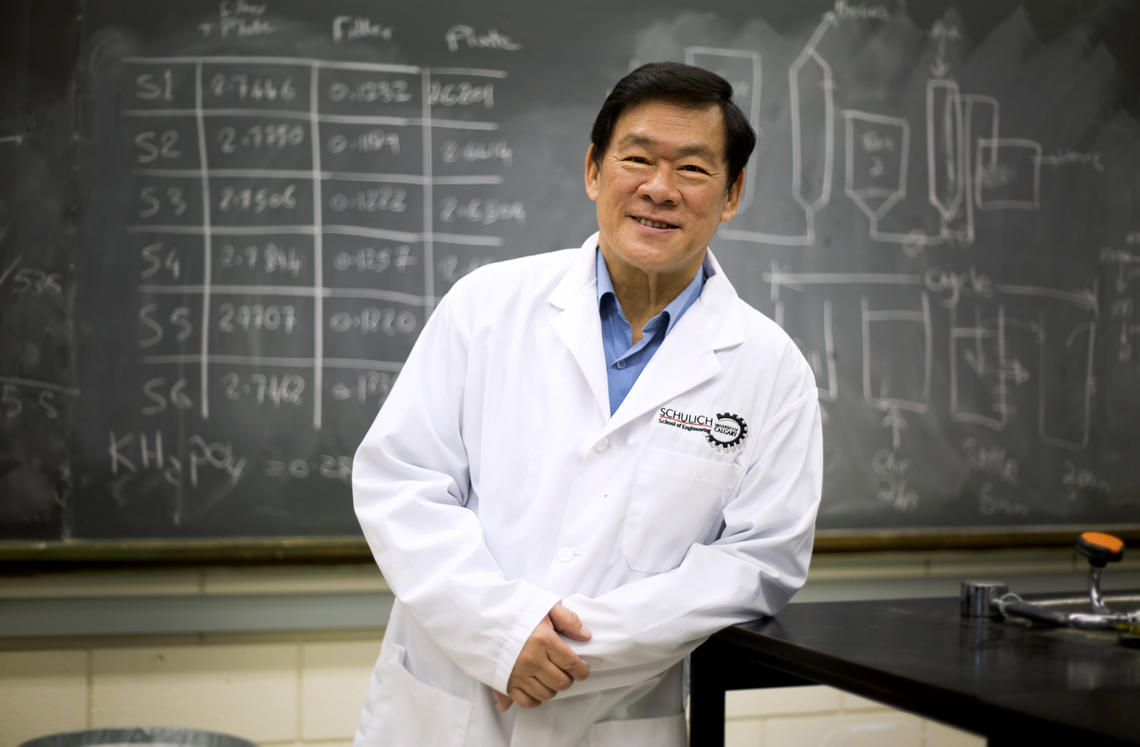Nov. 12, 2019
Engineering research impact by taking discoveries further

Alberta engineers are developing world-leading wireless technologies, inventing new ways to clean our water, and using digital engineering to create early warning systems that have the potential to save lives. These researchers are finding new ways to take their discoveries further.
"Research impact matters. Research literally changes lives," said Bill Rosehart, dean of the Schulich School of Engineering.
The impact of local research was never more apparent than at the 2019 ASTech Awards when several engineering researchers were honoured for their work.
In an increasingly digital world, there are constant demands to download data at higher speeds, to increase bandwidth or extend wireless coverage around the world. That's why electrical and computer engineering professor Dr. Fadhel Ghannouchi, PhD, developed digital predistoration technology, the first of its kind in the world.
This breakthrough technique revolutionized the wireless industry by improving efficiency, productivity and lowering network costs.
Civil engineering professor Dr. Joo-Hwa (Andrew) Tay, PhD, dedicated his career to developing more effective ways to make global water supplies cleaner and safer. Tay, who sadly passed away in 2019, developed aerobic granular sludge technology (AGS). His method uses half the energy and half the operating costs to remove more pollutants from a water source. It is being applied across a number of industries. Thanks to its low energy requirements, the technology is a strong option for use to improve water supplies rural areas and isolated Indigenous communities.
Chemical and petroleum engineering professor Dr. Nader Mahinpey, PhD, has developed transformative technology to capture greenhouse gas emissions at a rate less than half the cost of existing carbon capture processes. His work is part of a variety of new clean energy technologies being created at the Schulich School of Engineering.
Sparking successful start-ups
Several engineering professors have also used their research innovations to launch highly successful start-up companies. Sensor Up was founded by geomatics professor Dr. Steven Liang. It's cloud-based Internet of Things platform transforms silos of data into a system of systems that allows industrial companies to unlock real-time operational data and receive early warnings of dangerous situations before a problem occurs. The technology Liang designed has the potential to save lives.
It's not just engineering research teams that are making an impact with their ideas. Engineering alum Jeff LaFrenz BSc(Eng)'88, M Sc(Eng) '91 co-founded VizworX Inc with UCalgary computer science professor Dr. Frank Maurer, PhD.
Up to 30 per cent of a construction project's final costs are tied to design errors. By taking an engineers design plans from blueprints into 3D, VizworX Inc new Panoptica technology uses augmented reality to enables teams to walk through a full scale digital representation of a project design to look for aspects that may need to be modified before construction begins.
Innovation ecosystem
Changing lives through global research impact is a main goal within Catalyst for a Connected World, the engineering school’s strategic vision.
The University of Calgary's entrepreneurial ecosystem is a key factor in the success so many engineering researchers have experienced, said Rosehart.
With access to on-campus resources such as the Creative Destruction Lab (Rockies) and the Hunter Hub for Entrepreneurial Thinking, as well Innovation@UCalgary, the Schulich School of Engineering is better positioned to share our discoveries with the world than before.
This proven pathway to commercialization is only the beginning. Innovation is also about creating a space where a collision of ideas can occur.
"One of the unique things you find here at the Schulich School of Engineering, and across the University of Calgary, is a team-based approach to research. We can take on more complex problems that society needs solved, problems other schools can't even consider looking at," said Rosehart.
"It's about translating our global research into action," he said.

Dr. Joo-Hwa (Andrew) Tay, PhD, was honoured with the ASTech Award posthumously
Schulich School of Engineering
